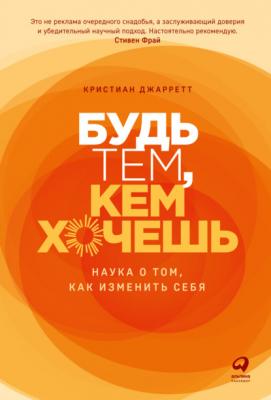ТОП просматриваемых книг сайта:
Будь тем, кем хочешь. Наука о том, как изменить себя. Кристиан Джарретт
Читать онлайн.Название Будь тем, кем хочешь. Наука о том, как изменить себя
Год выпуска 2021
isbn 9785961481471
Автор произведения Кристиан Джарретт
Жанр Личностный рост
Издательство Альпина Диджитал
25
Brent W. Roberts, Nathan R. Kuncel, Rebecca Shiner, Avshalom Caspi, and Lewis R. Goldberg, "The Power of Personality: The Comparative Validity of Personality Traits, Socioeconomic Status, and Cognitive Ability for Predicting Important Life Outcomes," Perspectives on Psychological Science 2, no. 4 (2007): 313–345.
26
Christopher J. Boyce, Alex M. Wood, and Nattavudh Powdthavee, "Is Personality Fixed? Personality Changes as Much as 'Variable' Economic Factors and More Strongly Predicts Changes to Life Satisfaction," Social Indicators Research 111, no. 1 (2013): 287–305.
27
Sophie Hentschel, Michael Eid, and Tanja Kutscher, "The Influence of Major Life Events and Personality Traits on the Stability of Affective Well-Being," Journal of Happiness Studies 18, no. 3 (2017): 719–741.
28
Petri J. Kajonius and Anders Carlander, "Who Gets Ahead in Life? Personality Traits and Childhood Background in Economic Success," Journal of Economic Psychology 59 (2017): 164–170.
29
Rodica Ioana Damian, Marion Spengler, and Brent W. Roberts, "Whose Job Will Be Taken Over by a Computer? The Role of Personality in Predicting Job Computerizability over the Lifespan," European Journal of Personality 31, no. 3 (2017): 291–310.
30
Benjamin P. Chapman and Lewis R. Goldberg, "Act-Frequency Signatures of the Big Five," Personality and Individual Differences 116 (2017): 201–205.
31
David A. Ellis and Rob Jenkins, "Watch-Wearing as a Marker of Conscientiousness," PeerJ 3 (2015): e1210.
32
Joshua J. Jackson, Dustin Wood, Tim Bogg, Kate E. Walton, Peter D. Harms, and Brent W. Roberts, "What Do Conscientious People Do? Development and Validation of the Behavioral Indicators of Conscientiousness (BIC)," Journal of Research in Personality 44, no. 4 (2010): 501–511.
33
Anastasiya A. Lipnevich, Marcus Credè, Elisabeth Hahn, Frank M. Spinath, Richard D. Roberts, and Franzis Preckel, "How Distinctive Are Morningness and Eveningness from the Big Five Factors of Personality? A MetaAnalytic Investigation," Journal of Personality and Social Psychology 112, no. 3 (2017): 491.
34
"The Big Five Inventory-2 Short Form (BFI-2-S)," accessed November 24, 2021, at http://www.colby.edu/psych/wp-content/uploads/sites/50/2013/08/bfi2s-form.pdf.
35
В действительности адреналиновой зависимости не существует. За удовольствие от экстремальных видов спорта и опасных видов деятельности отвечают эндорфины, которые вырабатываются в головном мозге. – Прим. науч. ред.
36
Michael A. Sayette, "The Effects of Alcohol on Emotion in Social Drinkers," Behaviour Research and Therapy 88 (2017): 76–89.
37
Dan P. McAdams, The Art and Science of Personality Development (New York: Guilford Press, 2015).
38
Michelle N. Servaas, Jorien Van Der Velde, Sergi G. Costafreda, Paul Horton, Johan Ormel, Harriette Riese, and Andre Aleman, "Neuroticism and the Brain: A Quantitative Meta-Analysis of Neuroimaging Studies Investigating Emotion Processing," Neuroscience and Biobehavioral Reviews 37, no. 8 (2013): 1518–1529.
39
Специалисты в области эволюционной психологии также указывают на то, что высокий невротизм, возможно, давал нашим предкам преимущество, помогая избегать ситуаций, связанных с угрозой для жизни.
40
Achala H. Rodrigo, Stefano I. Di Domenico, Bryanna Graves, Jaeger Lam, Hasan Ayaz, R. Michael Bagby, and Anthony C. Ruocco, "Linking Trait-Based Phenotypes to Prefrontal Cortex Activation During Inhibitory Control," Social Cognitive and Affective Neuroscience 11, no. 1 (2015): 55–65.
41
Brian W. Haas, Kazufumi Omura, R. Todd Constable, and Turhan Canli, "Is Automatic Emotion Regulation Associated with Agreeableness? A Perspective Using a Social Neuroscience Approach," Psychological Science 18, no. 2 (2007): 130–132.
42
Cameron A. Miller, Dominic J. Parrott, and Peter R. Giancola, "Agreeableness and Alcohol-Related Aggression: The Mediating Effect of Trait Aggressivity," Experimental and Clinical Psychopharmacology 17, no. 6 (2009): 445.
43
Scott Barry Kaufman, Lena C. Quilty, Rachael G. Grazioplene, Jacob B. Hirsh, Jeremy R. Gray, Jordan B. Peterson, and Colin G. DeYoung, "Openness to Experience and Intellect Differentially Predict Creative Achievement in the Arts and Sciences," Journal of Personality 84, no. 2 (2016): 248–258.
44
Mitchell C. Colver and Amani El-Alayli, "Getting Aesthetic Chills from Music: The Connection Between Openness to Experience and Frisson," Psychology of Music 44, no. 3 (2016): 413–427.
45
Douglas P. Terry, Antonio N. Puente, Courtney L. Brown, Carlos C. Faraco, and L. Stephen Miller, "Openness to Experience Is Related to Better Memory Ability in Older Adults with Questionable Dementia," Journal of Clinical and Experimental Neuropsychology 35, no. 5 (2013): 509–517; E. I. Franchow, Y. Suchy, S. R. Thorgusen, and P. Williams, "More Than Education: Openness to Experience Contributes to Cognitive Reserve in Older Adulthood," Journal of Aging Science 1, no. 109 (2013): 1–8.
46
В одноименной басне И. А. Крылова фигурируют Стрекоза и Муравей. – Прим. ред.
47
Timothy A. Judge, Chad A. Higgins, Carl J. Thoresen, and Murray R. Barrick, "The Big Five Personality Traits, General Mental Ability, and Career Success Across the Life Span," Personnel Psychology 52, no. 3 (1999): 621–652.
48
Антонио Веррио (1639–1707) – итальянский художник,

